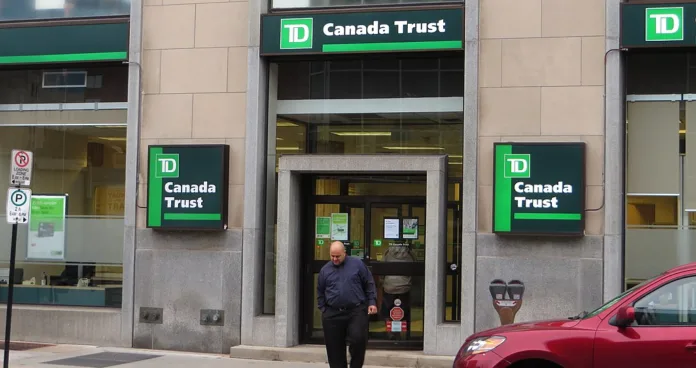Canadian lender agrees to a $3bn settlement over systemic lapses in its anti-money laundering programme, with us authorities accusing the bank of enabling criminal activity through neglected safeguards
TD Bank has agreed to a staggering $3bn settlement with the US government following charges that it failed to prevent criminal organisations from laundering hundreds of millions of dollars through its accounts. The Department of Justice (DoJ) revealed that the Canadian lender’s anti-money laundering (AML) programme had serious long-term deficiencies, which were not addressed due to internal cost-cutting measures.
Between 2013 and 2019, TD Bank failed to monitor 92% of its transaction volume, amounting to a jaw-dropping $18.3 trillion, according to the DoJ. Three distinct money-laundering networks moved over $670 million through the bank during this period, exposing its significant compliance failures.
The investigation uncovered that TD even instructed its branches to stop submitting reports on suspicious transactions related to certain customers, further exacerbating the situation. Shockingly, more than $5 billion in suspicious transactions were allowed to pass through accounts the bank had previously decided to close due to concerns about illicit activity.
Embed from Getty ImagesThe lender’s failures led to the charges against two units of TD Bank, based in Toronto, which pleaded guilty to several counts. These included conspiring to launder money, failing to maintain a robust AML programme, and neglecting to file accurate currency transaction reports. TD Bank, Canada’s second-largest financial institution by assets, now faces one of the largest penalties imposed on a financial institution by the US government in the past decade.
US Attorney General Merrick Garland strongly condemned TD Bank’s actions during a press conference. “TD Bank created an environment that allowed financial crime to flourish,” he said. “By making its services convenient for criminals, it became one.”
The DoJ’s deal with TD Bank includes the largest penalty ever imposed under the US Bank Secrecy Act, which obligates banks to protect the financial system from criminal abuse. Lisa Monaco, Deputy Attorney General, highlighted the gravity of the case: “Every bank compliance official in America should be reviewing today’s charges as a case study of what not to do.”
As part of the settlement, TD Bank has agreed to the appointment of an independent monitor who will oversee its operations for the next four years, ensuring that the bank rectifies its past mistakes and strengthens its compliance mechanisms.
The bank’s CEO, Bharat Masrani, acknowledged the gravity of the situation in a statement, calling it “a difficult chapter” in the institution’s history. “These failures took place on my watch as CEO, and I apologise to all our stakeholders,” Masrani said. The CEO had already announced plans to step down next year, but the timing of the scandal further cements his tenure as a tumultuous period for the bank.
TD’s systemic failures allowed criminals like Da Ying Sze, also known as David, to launder over $470 million through the bank’s accounts. According to Philip Sellinger, US Attorney for the District of New Jersey, David would regularly deposit massive sums of cash at TD branches, bribing bank employees with more than $57,000 in gift cards to turn a blind eye to his activities.
The scandal has wider ramifications for TD Bank, which has faced other recent challenges. The bank was forced to abandon a $13.4bn acquisition of US lender First Horizon, and its shares took a hit, falling by over 5% after the announcement of the guilty plea.
TD Bank’s involvement in money laundering activities has now been linked to several cases where employees were found accepting bribes in exchange for opening accounts for shell companies. These accounts were tied to debit cards that were then transported to Colombia, where they were used to withdraw cash from ATMs.
In addition to the DoJ’s penalties, TD faces fines from the Office of the Comptroller of the Currency, the Federal Reserve, and the US Treasury. These penalties, which include both criminal and civil charges, mark a significant moment in the bank’s history, as it deals with both reputational damage and financial consequences.
As part of the investigation, more than two dozen individuals, including two TD employees, have been charged in relation to the case. The investigation remains ongoing, and Attorney General Garland hinted at the possibility of further charges: “We would expect future cases against individuals.”
This settlement is one of the most significant in the financial sector over the last ten years, rivalled only by the $9bn fine imposed on France’s BNP Paribas in 2014 for sanctions violations and the $4.3bn penalty issued to cryptocurrency exchange Binance last year.
For TD Bank, which has long been known for its iconic green logo and sponsorship of the Boston Celtics’ home arena, this episode represents a serious blow to its reputation. The lender had already set aside $2.6bn in anticipation of the settlement, but the case serves as a sobering reminder of the far-reaching consequences of neglecting financial safeguards.
